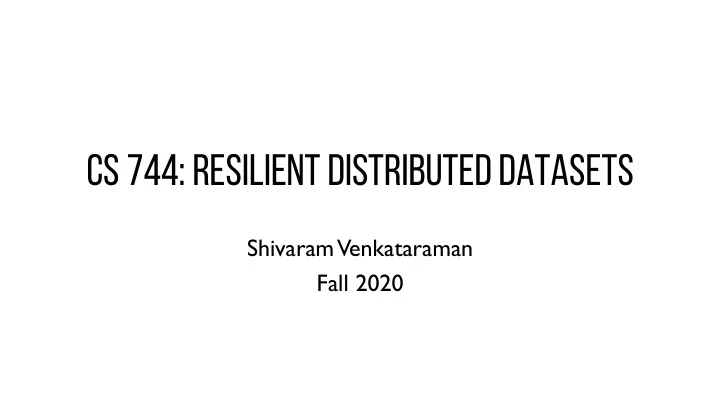

CS 744: Resilient Distributed Datasets Shivaram Venkataraman Fall 2020
ADMINISTRIVIA - Assignment 1: Due Sep 21, Monday at 10pm! - Assignment 2: ML will be released Sep 22 - Final project details: Next week
MOTIVATION: Programmability Most real applications require multiple MR steps – Google indexing pipeline: 21 steps – Analytics queries (e.g. sessions, top K): 2-5 steps – Iterative algorithms (e.g. PageRank): 10’s of steps Multi-step jobs create spaghetti code – 21 MR steps à 21 mapper and reducer classes
MOTIVATION: Performance MR only provides one pass of computation – Must write out data to file system in-between Expensive for apps that need to reuse data – Multi-step algorithms (e.g. PageRank) – Interactive data mining
Programmability Google MapReduce WordCount: • • #include "mapreduce/mapreduce.h" MapReduceSpecification spec; • • // User’s reduce function for (int i = 1; i < argc; i++) { • • • // User’s map function class Sum: public Reducer { MapReduceInput* in= spec.add_input(); • • • class SplitWords: public Mapper { public: in->set_format("text"); • • • public: virtual void Reduce(ReduceInput* input) in->set_filepattern(argv[i]); • • • virtual void Map(const MapInput& input) { in->set_mapper_class("SplitWords"); • • • { // Iterate over all entries with the } • • const string& text = input.value(); // same key and add the values • • • const int n = text.size(); int64 value = 0; // Specify the output files • • • for (int i = 0; i < n; ) { while (!input->done()) { MapReduceOutput* out = spec.output(); • • • // Skip past leading whitespace value += StringToInt( out->set_filebase("/gfs/test/freq"); • • • while (i < n && isspace(text[i])) input->value()); out->set_num_tasks(100); • • • i++; input->NextValue(); out->set_format("text"); • • • // Find word end } out->set_reducer_class("Sum"); • • int start = i; // Emit sum for input->key() • • • while (i < n && !isspace(text[i])) Emit(IntToString(value)); // Do partial sums within map • • • i++; } out->set_combiner_class("Sum"); • • if (start < i) }; • • Emit(text.substr( // Tuning parameters • • start,i-start),"1"); REGISTER_REDUCER(Sum); spec.set_machines(2000); • • } spec.set_map_megabytes(100); • • } spec.set_reduce_megabytes(100); • • }; • // Now run it • • REGISTER_MAPPER(SplitWords); MapReduceResult result; • if (!MapReduce(spec, &result)) abort(); • return 0; • • int main(int argc, char** argv) { } • ParseCommandLineFlags(argc, argv);
APACHE Spark Programmability val file = spark.textFile(“hdfs://...”) val val val counts = file.flatMap(line => line.split(“ ”)) .map(word => (word, 1)) .reduceByKey(_ + _) counts.save(“out.txt”)
APACHE Spark Programmability: clean, functional API – Parallel transformations on collections – 5-10x less code than MR – Available in Scala, Java, Python and R Performance – In-memory computing primitives – Optimization across operators
Spark Concepts Resilient distributed datasets (RDDs) – Immutable, partitioned collections of objects – May be cached in memory for fast reuse Operations on RDDs – Transformations (build RDDs) – Actions (compute results) Restricted shared variables – Broadcast, accumulators
Example: Log Mining Find error messages present in log files interactively (Example: HTTP server logs) Base RDD Transformed RDD Worker lines = spark.textFile(“hdfs://...”) results errors = lines.filter(_.startsWith(“ERROR”)) Block 1 tasks Driver messages = errors.map(_.split(‘\t’)(2)) Action messages.cache() messages.filter(_.contains(“foo”)).count Worker Block 2 Worker Block 3
Example: Log Mining Find error messages present in log files interactively (Example: HTTP server logs) Cache 1 Worker lines = spark.textFile(“hdfs://...”) results errors = lines.filter(_.startsWith(“ERROR”)) Block 1 tasks Driver messages = errors.map(_.split(‘\t’)(2)) messages.cache() messages.filter(_.contains(“foo”)).count Cache 2 messages.filter(_.contains(“bar”)).count Worker . . . Cache 3 Block 2 Worker Result: full-text search of Wikipedia in <1 sec Result: search 1 TB data in 5-7 sec (vs 170 sec for on-disk data) (vs 20 sec for on-disk data) Block 3
Fault Recovery messages = textFile(...).filter(_.startsWith(“ERROR”)) .map(_.split(‘\t’)(2)) HDFS File Filtered RDD Mapped RDD filter map (func = _.contains(...)) (func = _.split(...))
Other RDD Operations map flatMap filter union Transformations sample join (define a new RDD) groupByKey cross reduceByKey mapValues cogroup ... collect count Actions reduce saveAsTextFile (output a result) take saveAsHadoopFile fold ...
DEPENDENCIES
Job Scheduler (1) B: A: Captures RDD dependency graph G: Stage 1 groupBy Pipelines functions into “stages” F: D: C: map E: join Stage 2 union Stage 3 = cached partition
Job Scheduler (2) B: A: Cache-aware for data reuse, locality G: Stage 1 groupBy Partitioning-aware to avoid shuffles F: D: C: map E: join Stage 2 union Stage 3 = cached partition
CHECKPOINTING rdd = sc.parallelize(1 to 100, 2).map(x à 2*x) rdd.checkpoint()
SuMMARY Spark: Generalize MR programming model Support in-memory computations with RDDs Job Scheduler: Pipelining, locality-aware
DISCUSSION https://forms.gle/4JDXfpRuVaXmQHxD8
When would reduction trees be better than using `reduce` in Spark? When would they not be ?
NEXT STEPS Next week: Resource Management - Mesos,YARN - DRF Assignment 1 is due soon!
Recommend
More recommend